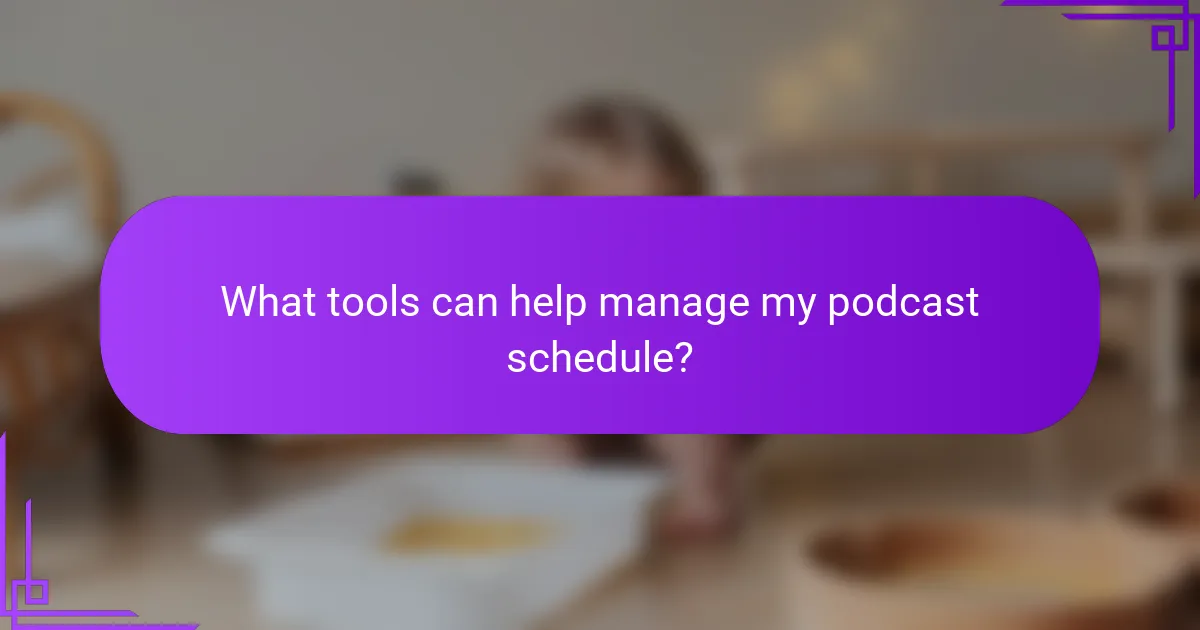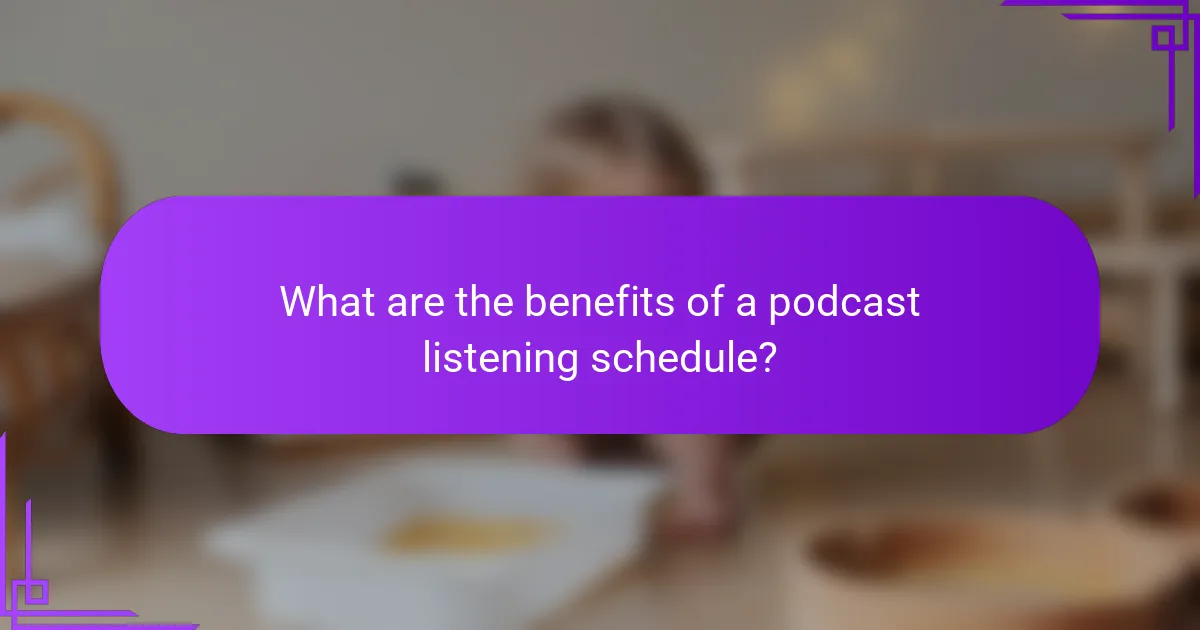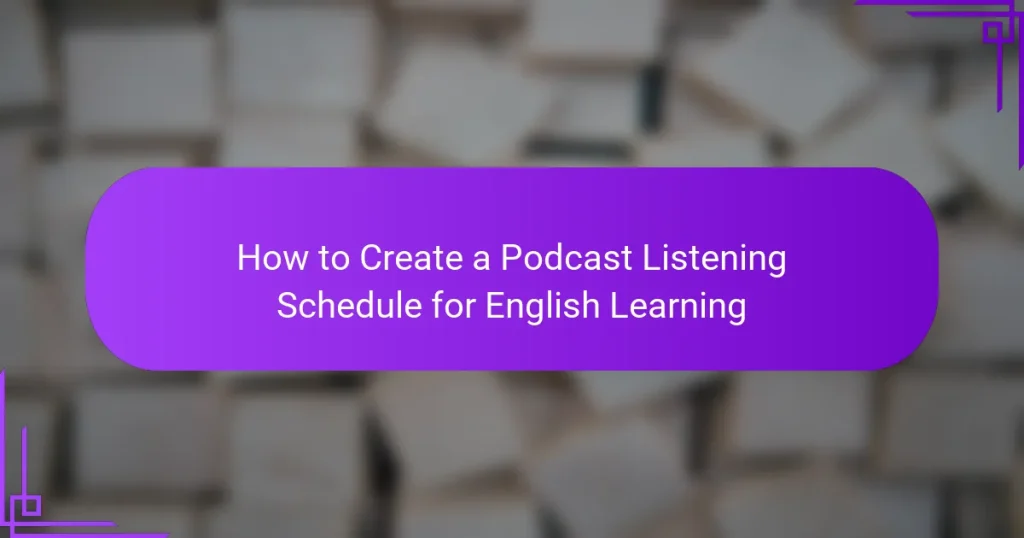Creating a podcast listening schedule for English learning can significantly enhance your language skills. By setting clear goals, selecting appropriate podcasts, and establishing a consistent routine, you can maximize your learning experience and maintain engagement with the material. This structured approach not only helps you stay organized but also allows for effective tracking of your progress over time.

How can I create a podcast listening schedule for English learning?
Creating a podcast listening schedule for English learning involves setting clear goals, selecting suitable podcasts, determining your available time, and establishing a consistent routine. This structured approach helps maximize your learning and ensures that you stay engaged with the material.
Define your learning goals
Start by identifying what you want to achieve through podcast listening. Are you focusing on improving your vocabulary, enhancing your listening skills, or gaining cultural insights? Setting specific goals will guide your podcast selection and help you measure your progress.
For instance, if your goal is to expand your vocabulary, you might aim to learn a certain number of new words each week. Alternatively, if you’re preparing for an English proficiency exam, you might focus on podcasts that cover relevant topics and language usage.
Select relevant podcasts
Choose podcasts that align with your learning goals and interests. Look for shows that are designed for English learners or those that discuss topics you enjoy, as this will keep you motivated. Popular options include “EnglishClass101,” “The English We Speak,” and “ESL Pod.”
Consider the podcast’s difficulty level as well. Some shows may use complex vocabulary or fast speech, which can be challenging for beginners. Aim for a mix of easy and moderate difficulty to gradually improve your skills.
Determine your available time
Assess how much time you can realistically dedicate to listening to podcasts each week. This could range from a few minutes daily to several hours a week, depending on your schedule. Be honest about your availability to avoid setting unrealistic expectations.
For example, if you have 30 minutes a day, you could listen to one or two episodes per day. If your time is limited, consider shorter podcasts or episodes that fit into your commute or daily routine.
Establish a consistent listening routine
Consistency is key to effective learning. Set aside specific times for podcast listening, such as during your morning commute or while exercising. This routine will help reinforce your learning and make it a habit.
To maintain motivation, consider tracking your progress. You could create a simple checklist of episodes you’ve listened to or maintain a journal of new vocabulary learned. This will help you stay accountable and see how far you’ve come over time.

What are the best podcasts for English learners?
Some of the best podcasts for English learners include BBC Learning English, EnglishClass101, and The English We Speak. These podcasts offer engaging content tailored to various proficiency levels, making them effective tools for improving language skills.
BBC Learning English
BBC Learning English provides a wealth of resources designed specifically for English learners. The podcast features a variety of topics, including grammar, vocabulary, and pronunciation, presented in short, digestible episodes.
Each episode typically lasts around 10-15 minutes, making it easy to fit into a busy schedule. The content is updated regularly, ensuring learners have access to current language usage and cultural insights.
EnglishClass101
EnglishClass101 offers a structured approach to learning English through podcasts that cater to different skill levels. The episodes range from beginner to advanced, allowing learners to progress at their own pace.
With lessons that often include dialogues, vocabulary explanations, and cultural notes, learners can expect to enhance their listening and speaking skills effectively. The platform also provides supplementary materials for deeper learning.
The English We Speak
The English We Speak focuses on idiomatic expressions and phrases commonly used in everyday conversation. Each episode is concise, usually around 3-5 minutes, making it easy to learn and practice new expressions quickly.
This podcast is particularly useful for learners looking to sound more natural in their speech. By incorporating these phrases into daily conversations, learners can improve their fluency and comprehension in real-world contexts.

How do I track my progress with podcasts?
Tracking your progress with podcasts involves consistently monitoring your listening habits and language improvement. This can be achieved through various methods that help you stay organized and motivated in your English learning journey.
Use a learning journal
A learning journal is an effective tool for tracking your podcast progress. By writing down your thoughts, new vocabulary, and insights after each episode, you create a personal record of your learning journey. This practice not only reinforces what you’ve learned but also highlights areas that need more attention.
To maintain your journal, set aside a few minutes after each podcast episode to jot down key takeaways. You might include the date, episode title, and a summary of the content. Over time, this will provide a clear picture of your growth and areas for improvement.
Set measurable milestones
Setting measurable milestones helps you stay focused and motivated while learning through podcasts. Define specific goals, such as completing a certain number of episodes each week or mastering a set amount of new vocabulary. These milestones should be realistic and tailored to your current level of English proficiency.
For example, you could aim to listen to three episodes per week and write down five new words from each. Regularly assess your progress against these goals and adjust them as needed to ensure they remain challenging yet achievable.

What tools can help manage my podcast schedule?
To effectively manage your podcast listening schedule, consider using dedicated podcast apps and calendar tools. These resources can help you organize episodes, set reminders, and track your progress in learning English.
Podcast apps like Apple Podcasts
Podcast apps such as Apple Podcasts are designed to streamline your listening experience. They allow you to subscribe to your favorite shows, download episodes for offline listening, and create playlists tailored to your learning goals.
When using a podcast app, take advantage of features like episode notifications and playback speed adjustments. This can help you stay on track and make the most of your listening time, whether you’re commuting or studying at home.
Calendar tools like Google Calendar
Calendar tools like Google Calendar can be invaluable for scheduling your podcast listening sessions. You can create recurring events for specific days and times, ensuring you dedicate regular time to your English learning through podcasts.
Utilize reminders and notifications to keep you accountable. Setting aside 30 minutes a few times a week can significantly enhance your language skills, so consider blocking out this time in your calendar to maintain consistency.

What are the benefits of a podcast listening schedule?
A podcast listening schedule can significantly enhance your English learning experience by providing structure and consistency. By dedicating specific times to listen to podcasts, learners can improve their language skills more effectively and efficiently.
Improved language retention
Creating a podcast listening schedule helps reinforce language retention by allowing learners to revisit topics and vocabulary regularly. Consistent exposure to the same content over time aids memory, making it easier to recall words and phrases when needed.
For example, listening to a podcast episode multiple times throughout the week can help solidify understanding and usage of new vocabulary. Aim for a schedule that includes listening to each episode at least two to three times, spaced out over several days.
Enhanced listening skills
A structured podcast listening schedule can sharpen listening skills by providing diverse audio content that challenges comprehension. Regularly engaging with different accents, speeds, and contexts improves the ability to understand spoken English in real-life situations.
Consider incorporating a variety of podcast genres, such as news, storytelling, or interviews, to expose yourself to different speaking styles. Aiming for at least 30 minutes of listening per session, several times a week, can lead to noticeable improvements in comprehension and fluency.

How can I adapt my schedule for different learning levels?
To adapt your podcast listening schedule for different learning levels, consider the complexity of the content and the learner’s proficiency. Beginners may benefit from shorter, simpler episodes, while advanced learners can handle longer, more challenging material.
Beginner Level
For beginners, focus on podcasts that use clear, slow speech and basic vocabulary. Aim for episodes that last between 10 to 20 minutes, allowing for manageable listening sessions. This duration helps prevent overwhelm and encourages comprehension.
Consider creating a schedule that includes 2-3 episodes per week. This frequency allows for regular practice without excessive pressure. Pair listening with activities like note-taking or summarizing to reinforce learning.
Intermediate Level
Intermediate learners can tackle podcasts with moderate complexity and a wider range of vocabulary. Episodes can range from 20 to 40 minutes, providing a balance of challenge and engagement. This level encourages deeper understanding and critical thinking.
Incorporate 3-4 episodes weekly into your schedule. This allows learners to explore various topics while still maintaining a manageable pace. Encourage discussions or reflections on the content to enhance retention.
Advanced Level
Advanced learners should engage with podcasts that feature native speakers and complex themes. Episodes of 40 minutes or longer can be beneficial, as they provide exposure to nuanced language and diverse accents. This level promotes fluency and comprehension of idiomatic expressions.
Consider a schedule of 4-5 episodes per week, allowing for in-depth exploration of subjects. Encourage learners to analyze the content critically and apply new vocabulary in their own speaking or writing.


